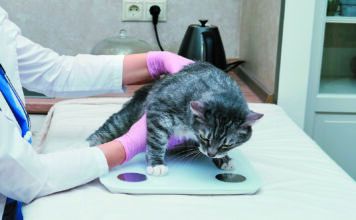When Your Cat Keeps Eating Things That Aren’t Food
Wool and other fabrics, plastic (including plastic casing surrounding electrical cords), rubber, pins and needles, newspapers. These are just some of the items that might be chewed on and swallowed by cats afflicted with pica, which is the eating of non-food items. The word pica is based on the Latin word “picave.” It means magpie — a bird with indiscriminate dietary habits.
Rodent ulcer
Q: My cat has developed a reddish-brown sore on her upper lip. It doesn’t seem to bother her, but it looks awful. And while I thought it would go away on its own, it hasn’t. What should I do?
Losing Excess Weight Does Much More Than Make a Cat Healthier
Sure, if your cat is overweight (and as many as six in 10 cats are), you want her to be able to take off excess pounds in order to become healthier and live longer. Extra weight in cats is associated with such conditions as insulin resistance (which can lead to diabetes), urinary tract disease, and liver problems. And those conditions are expensive. People with cats who weigh more than they should spend 36 percent more on diagnostic procedures than people with healthy-weight felines. Now, a new study also shows that losing excess weight doesn’t only increase longevity while saving money. It also improves a cat’s quality of life.
Deciding How to Take a Cat’s Temperature
The three most dreaded words for many a cat owner are “Take her temperature.” The startled, angry reaction of a cat having a thermometer pushed into her behind — or even placed in her ear — is not something people look forward to.
Feline Arthritis Pain: The Signs Can Be Subtle
Some 90 percent of cats develop arthritis over time, research suggests, with about half of them actually suffering from arthritis pain. That comes to almost one out of two house cats in pain, yet people often aren’t aware. They think their cat isn’t as nimble simply because he’s getting older. Or they believe that if a cat had arthritis, he would start limping. But while dogs limp from arthritis pain, cats work to hide their discomfort. They like to mask their vulnerability so predators can’t see their weakness. No matter that there may be no predators in your home. That feline tendency is genetically built in.
Pillow Foot
If the foot pad on one or more of your cat’s feet becomes puffy and swollen, there’s a good chance she has pillow foot, medically termed feline plasma cell pododermatitis. It means the skin on the foot has become inflamed due to infiltration of the pad with plasma cells, which belong to the immune system. The thought is that the immune system somehow becomes overstimulated, resulting in the inflammation.
New Drug for a Complication of Chronic Kidney Disease
Cats with chronic kidney disease are prone to developing a secondary condition called nonregenerative anemia, a potentially fatal complication that keeps down the production of red blood cells needed to carry oxygen from the lungs to all the body’s tissues. It occurs because the compromised kidneys produce less of a hormone called erythropoietin, which helps the bone marrow produce red blood cells. But a new drug, Varenzin-CA1, treats the problem by increasing erythropoietin production.
Can Your Cat Pay It Forward As a Blood Donor?
Like people, cats sometimes need blood, not just because of blood loss that may occur during an operation or a car accident but also as a result of such conditions as kidney failure or leukemia. Might your cat make a good blood donor?
Checking the urine
Q: My veterinarian is suggesting my cat have a urinalysis. He has suggested it in the past, but I have opted not to go ahead with it. Now that my cat is 10 he’s saying it really would be a good idea. What do you think? One reason I am concerned is that I don’t know how I would “catch” the urine.
When a Cat Starts Losing Hair
You’ve noticed your cat has started losing hair, perhaps in one spot, perhaps in a number of areas on her body. It’s alarming because a cat’s fur is so much a part of her appearance. Fortunately, the reason for a cat’s hair loss, known medically as alopecia, can almost always be found. Once it is, effective solutions are available. Here are five reasons that a cat would lose hair — and how to address the problem.
Hairball concerns
But What Does Lethargy Look Like?
It’s often said that if a cat is in a prolonged state of lethargy, he should be taken to the vet to see if there’s an underlying cause. Lethargy can be a sign of everything from an infection to arthritis to diabetes. But what is lethargy?













